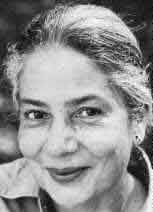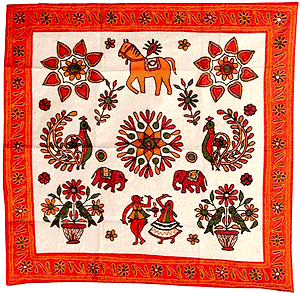Desai, Clear Light of Day:
Comprehension Questions |

|
Part I
- What are the differences in how Tara and Bim react to the rose walk, the dog, and the
other changes (or lack thereof) in their old home and past lives?
- What makes Old Delhi different from New Delhi? What is the "Old Delhi
decadence"? What does this say about the value of silence? (13)
- Describe Baba’s attempts to go out into the world.
- Contrast the house’s influence on Tara with Bakul’s plans for her (20-21).
- What has estranged Bim from Raja?
- Describe the various members of the Misra family.
- What is Bakul’s attitude towards being an ambassador?
- How does Bakul describe India to outsiders? Why does Bim disagree with him? (35)
- Note Mulk’s outburst and his concerns with music.
- How does Tara respond to Bim’s quoting Eliot? (40-41)
- How do the sisters remember the summer of ’47? (42-43)
Part II
- In what ways is poetry important to Raja? the Urdu language? (45-46)
- How does Raja react to Hyder Ali’s library? his home and lifestyle? (47ff.)
- What is significant about Raja’s choice of college? Why does Raja’s father
fear for his life?
- Describe Raja’s experience at college.
- In what ways does Raja imagine himself as a Romantic hero? (55-56)
- How responsibility falls on Bim as part II progresses?
- What effect do the parents' deaths have on the remaining family? (64-65)
- Why is Bim equally bored with Dr. Biswas and Bakul?
- Note how Bakul describes the political situation surrounding the partition.
- What do they find at Ali’s house? Why is the servant afraid?
- How does Mira describe life? How does she respond to the children as flames? (77-79)
- Describe Dr. Biswas’ reaction to Mozart and German culture (82-83).
- How does Mira’s madness see her clothes and her life? (89-90)
- How do Bim and Raja react to Gandhi’s assignation? (93-94)
- Note Mira’s continuing and worsening madness: Why does Bim compare/ not compare
Mira’s death to drowning?
Part III
- Note how the novel loops back to former recalled moments in Bim’s and Tara’s
life.
- Why is Mira sent for? What kind of relationship does she have with the other children?
(103-105)
- How did Mira’s former family treat her? (108)
- Why do the children think Mira is not fit to be a mother? Do you agree? (109-111)
- How does Raja react as he grows older? How does this shape his relationship with his
younger sisters?
- How do each of the children respond to reading?
- Note how differently Tara and Bim respond to school (122-123).
- What two events "cut through the grey chalk dust of school life with stripes of
shocking color"? (127ff.)
- What do Bim and Tara think about wearing Raja’s pants and smoking his cigarettes?
(132-133)
- Contrast Bim’s and Tara’s view of college and marriage (140-141).
Part IV
- How does Bim imagine Raja’s life? Why does she distinguish between Raja
having a "vocation" and a "hobby"? (145)
- What is Tara’s opinion of the way Bim runs her house?
- Why does Bim wish Raja were there to talk with Sharma about the insurance business?
- Note Bim’s continued anger and Tara’s concern over it.
- After becoming angry with Baba, what does Bim learn about her anger? her feelings
towards Baba’s silence? her love for her family? her need to forgive Raja? (163-165)
- Why do you think the emperor’s last words appeal to Bim so much? (167-169)
- Why is Tara still concerned about the swarm of bees that attackef Bim? What does Bim
mean by "Nothing’s over…ever"? (174)
- How are all the people at Mulk’s concert like a tapestry? (179-180)
- What does Mulk’s guru’s voice represent? (181-183)
What are Bim’s views of history?
|
General Questions |
- What role does memory play in the novel?
- How is forgiveness tied to one's view of the past?
- What do we learn in the novel about men and women's roles? Who
has made the best choices?
- What do we learn about the racial tensions between Muslims and
Hindus? about class struggles? about generational differences?
- What is the work's overall message about family?
|
 |
|
